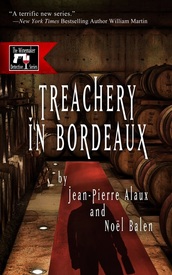
In this volume we are introduced to Benjamin Cooker, a middle-aged wine expert, author, and consultant, who is meticulous in his historical research and knowledgeable in the country’s winemaking processes and regions. He interviews and hires an earnest young man named Virgile Lanssien, the only candidate we are introduced to, who carries out his requests of tasks and errands. He also has a wife who cooks delicious food and a pair of married friends whose “company was always pleasant.” Much of Benjamin’s time is taken up with antiques shopping, revising his manuscript, and falling asleep with a cigar and glass of wine.
Is it fair to blame a mellow Merlot if it fails to live up to the expectations held for a bold and spicy Grenache? After all, chacun à son gout. Yet Treachery in Bordeaux left me unsatisfied, and here’s why:
1) The varietal doesn’t deliver on its crop. The American series label reads “The Winemaker Detective”, and it was the “detective” part that made me choose the story, with “winemaker” an intriguing addition to a familiar genre. But just as I do not read Nero Wolfe mysteries for tips on horticulture or Hercule Poirot crime stories to learn more about Belgian heritage, my foremost hope here was to find a compelling mystery foremost, with the vineyards of Bordeaux providing an engaging backdrop. The writers know the wine business and write convincingly on the scientific and economic sides of the profession. The mystery construction and development, at least in terms of successful genre conventions, is another matter.
2) The plot continually shortchanges its yield. Treachery in Bordeaux can best be described as a procedural mystery, meaning that it is structured to report developments of a crime investigation instead of following a detective who actively collects clues, interviews suspects, and solves the puzzle through deduction – the classical whodunit. While procedurals can be fascinating constructions of “what happens next?” – read just about anything that Georges Simenon or Nicolas Freeling has written as an example – it is the approach to plotting by Alaux and Balen that left me continually disappointed. For one thing, the reader is certainly ahead of the detective in suspecting sabotage; rather than listen to the wine alchemist discuss at length the nature and treatment of a Brett infection, I want to see Benjamin Cooker begin to look for suspects. (He does this eventually, farming out the task to an ex-government acquaintance.)
Also, the only truly engaging character in this short book, an elderly recluse with sharp, angry views on the suburbanization of Pessac’s countryside, dies after his one brief scene. For a moment, the story becomes interesting again: did the man know too much? Was his death a murder? But such a theory is dismissed by the authors as soon as the reader starts to consider the possibilities, and we are back to the relatively boring case of the infected tanks. That case, by the way, is concluded abruptly and anticlimactically through Virgile’s perusal of documents on the culprit’s computer, which is even less interesting than if he had found a signed confession reading “I dood it.”
3) The wine itself lacks character. Perhaps future entries improve on this, but the first book tells us that the characters here are interesting and worth following, even when their actions and dialogue repeatedly fail to deliver. There’s a great amount of narrative telling here, with no follow-through: the story notes that Cooker’s scientific colleague “had certainly been disappointed by the thoughtlessness of men” and that his wife “was bright, pragmatic, and unpretentious.” Okay, but neither character is given any personality in speech or action to make such an impression.
The winemaker detective himself, we are told, has a personality that makes him both loved and hated in his profession, and raised to the point of a celebrity. He is presented as knowledgeable of his craft, surely, but beyond that Benjamin Cooker is such an unremarkable and passive man that it’s hard to care about him solving crimes on the page. Assistant Virgile is respectful, polite, capable, and generates absolutely no interest or friction. (Imagine if Cooker hired an assistant who constantly poked and challenged him; no more drowsy nights in the chair for him! No more featureless expository scenes for the reader!) Wife, friends, and co-workers here are so blandly drawn in their bourgeois sameness that I cannot recall them just a few days after encountering them in print. Only Ferdinand Tenotier, the angry old man who has a reason for being passionate and colorful, comes alive as a character. I would wish that this intriguing person take over as the real detective of the series, except that he suffers the book’s only death, and his demise is not even part of the central plot. Monsieur Tenotier, you have truly died in vain.
Treachery in Bordeaux is included in The Winemaker Detective Omnibus, which I received from its publisher Le French Book via NetGalley to provide a candid review.
 RSS Feed
RSS Feed